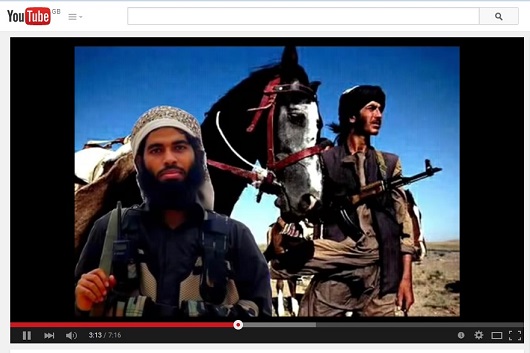Social media spreads terrorist tune

Islamist hymns, filmed and shared on YouTube, have become a powerful propaganda tool used by jihadists to win hearts and minds and to recruit followers, according to terrorism expert Moutaz Alkheder of the University of St Andrews.
The post-graduate student will deliver a ground-breaking analysis of the propaganda power of Islamized hymns at the University’s third biennial conference on Syria this week (1-3 July, 2015).
Alkheder’s research reveals that the unique attribute that distinguishes the Syrian revolution from other Arab Spring revolutions is the nature of the songs used during the rallies that protesters held in streets and squares. Although these hymns (nasheeds) existed before the outbreak of the Syrian revolution, this revolution can be seen as a turning point – as for the first time jihadists Islamized traditional songs to mobilise people on a large scale.
Alkheder explains: “Cognizant of the success of the secular songs and outdoor celebrations of the peaceful Syrian protestors, jihadists adopted the style while replacing with nasheeds so as to widen the jihadists’ appeal and attract the sympathies and loyalties of Syrian protestors.
“The importance of the Syrian conflict in particular is that this Islamized style of protest has become a model to be imitated by other jihadists.”
This topic is critically important on two levels: academic and operational. The academic importance is represented by the fact that this new tendency demonstrates a high level of pragmatism by these terrorist groups since they do not hesitate in resorting to tools which have long been viewed by them and their theologians as heresy, morally corrupt and forbidden (haram). Content analysis of these songs can help academics and researchers not only deconstruct the terrorist message but also understand the terrorist mentality.
The operational importance is twofold: first, these nasheeds resonate on the battlefield. They actually help radicalise people and recruit new terrorists, or at least help gain sympathisers outside their immediate territory owing to the facilitation by the Internet. Second, and more critical, these nasheeds endow the jihadist cause with an emotional dimension or legitimise the jihadist cause at an emotional level. The jihadist cause might be religious or political but to have an emotional appeal is a novelty.
Alkheder has examined a sample of the 20 most viewed Islamist extremists’ nasheeds on YouTube with the intention of finding common patterns and themes. He found that most jihadi nasheeds call for the use of a maximum level of violence and brutality, and sell them in a passionate way that might be termed the “romanticization of brutality”. This emotional appeal, according to Alkheder, can only be felt through listening to the soulful and melodious voices of the nasheeds. One can note the irony and contradiction: a soft-hearted and compassionate voice that preaches hatred and brutality. The nasheeds also display nostalgia for an Islamic golden age. By evoking the Arab and Islamic memory, they garner broad-based appeal. Furthermore, in contrast to the older nasheeds that focused on the perceived victimization of Muslims, post-Arab Spring nasheeds tend to depict jihadists as having the upper hand, as assertive and positive.
The international conference will bring together in one place the largest and most diverse concentration of scholars of Syria. Participants include Professor David Lesch, Steven Heydemann of the United States Institute of Peace, Lord Williams and William Zartman, the world’s most famous expert on conflict resolution in failed states. Media are welcome to attend.
Notes to news editor
Conference programme and more details is available at Syria Conference.
Moutaz Alkheder is currently an MLitt student in Terrorism Studies programme at St Andrews University. He obtained his BA in Political Science from Damascus University, Syria, 2005 and Post-graduate Diploma in International Relations, 2006 from the same university. After that, he worked as teaching assistant at Damascus University from 2007 to 2012, lecturing, giving seminars and co-supervising research projects undertaken by undergraduate students. In addition to his interest in Terrorism and Political Violence Studies, he is interested in Syrian and Arab politics, and political Islam movements. His current work is particularly concerned with the process of Islamisation and militarisation of the Syrian uprising of 2011.
Moutaz Alkheder is available for interview. Please contact the Press Office to arrange on 01334 462 167.
Some Islamist nasheeds (NB these were available on YouTube at the time of going to press, but may be removed by YouTube or the organisation who posted them at any time):
My greetings are to the State (IS)
We send melodies from our peninsula
Category University news